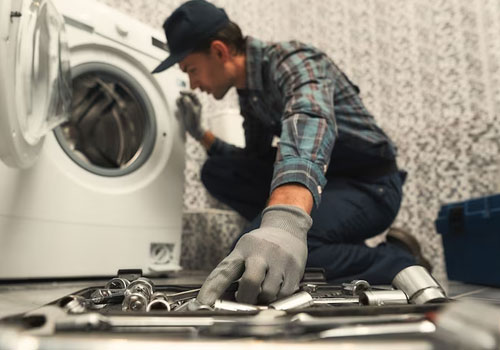
Over the years, washing machine manufacturers have developed new approaches within the regulations on water and electricity usage. They’ve also included computer boards and sensors inside the washing machine brains to detect load size, water temperature, gentle cycles, and much more. This makes it a challenge to stay up-to-date on the latest technologies. However, our experienced technicians are regularly trained and know how to diagnose and repair these more complicated machines.
Our washing machine repair services can take care of things like:
Washing machines come in a variety of sizes and models and for this reason, each repair is different. Our technicians like to be prepared before heading out to a job, so it’s important to provide as much information as possible so they can help you in the most efficient manner. When you make a call to Gulf Coast Appliance Repair, make sure you follow these tips to ensure a successful washing machine repair:

While we’re happy to visit your home and make a repair for you, we’d also be happy to see your washing machine stay in working order throughout its lifetime. The best way to do this is with preventative maintenance. Preventative maintenance is crucial to ensure the longevity and efficient performance of your washing machine. Here are five of our best preventative maintenance tips for washing machines:
Unfortunately, residual detergent, fabric softener, and lint can accumulate in your washing machine over time, which leads to unpleasant odors and potential mold growth. To keep it clean, run a hot water cycle with vinegar or a washing machine cleaner once a month. Then, wipe down the door seal with a damp cloth to remove any residue.
The filter traps debris from your laundry, and if it isn’t cleaned regularly, it can impede water drainage and affect the washing machine’s performance. For the best results, refer to your machine’s manual to locate and clean the filter regularly, typically every few months will do the trick.
The word “leak” is scary for every homeowner. Most often, damaged hoses are the cause of water leaks. In the worst cases, leaks lead to flooding and damage to your home. To prevent this, inspect the hoses for any visible signs of wear, including cracks or bulges. A good rule of thumb is to replace your washing machine’s hose every five years, even if it appears to be in good condition.
Imbalance loads include clothes not being evenly distributed in the drum and overfilled loads. Both of these can cause excessive wear and tear on your washing machine, leading to the need for repairs or premature failure. When starting a load of laundry, make sure you distribute the clothes evenly in the drum to maintain balance during the spin cycle. Also, make sure you don’t overload the washing machine by filling it above its capacity. A safe capacity limit should be included in the manufacturer’s guidelines.
An unlevel washing machine can cause excessive vibrations, noise, and potential damage to the machine. To avoid this, use a level to check if the washing machine is evenly balanced on all four legs. Adjust the legs as needed to ensure stability and reduce vibrations during operation.